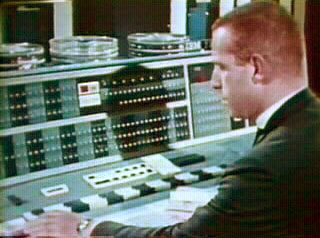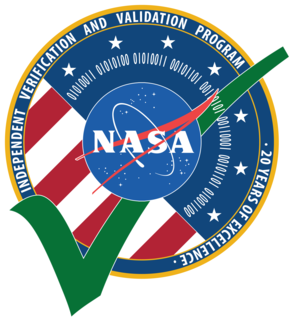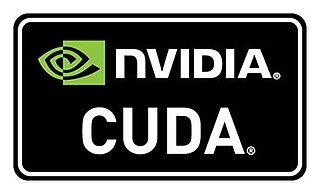Related Research Articles

Fortran is a general-purpose, compiled imperative programming language that is especially suited to numeric computation and scientific computing.

Convex Computer Corporation was a company that developed, manufactured and marketed vector minisupercomputers and supercomputers for small-to-medium-sized businesses. Their later Exemplar series of parallel computing machines were based on the Hewlett-Packard (HP) PA-RISC microprocessors, and in 1995, HP bought the company. Exemplar machines were offered for sale by HP for some time, and Exemplar technology was used in HP's V-Class machines.

The IBM 7090 is a second-generation transistorized version of the earlier IBM 709 vacuum tube mainframe computer that was designed for "large-scale scientific and technological applications". The 7090 is the fourth member of the IBM 700/7000 series scientific computers. The first 7090 installation was in December 1959. In 1960, a typical system sold for $2.9 million or could be rented for $63,500 a month.

OpenMP is an application programming interface (API) that supports multi-platform shared-memory multiprocessing programming in C, C++, and Fortran, on many platforms, instruction-set architectures and operating systems, including Solaris, AIX, FreeBSD, HP-UX, Linux, macOS, and Windows. It consists of a set of compiler directives, library routines, and environment variables that influence run-time behavior.

Alliant Techsystems Inc. (ATK) was an American aerospace, defense, and sporting goods company with its headquarters in Arlington County, Virginia, in the United States. The company operated in 22 states, Puerto Rico, and other countries. ATK's revenue in the 2014 fiscal year was about US$4.78 billion.

In satellite laser ranging (SLR) a global network of observation stations measures the round trip time of flight of ultrashort pulses of light to satellites equipped with retroreflectors. This provides instantaneous range measurements of millimeter level precision which can be accumulated to provide accurate measurement of orbits and a host of important scientific data. The laser pulse can also be reflected by the surface of a satellite without a retroreflector, which is used for tracking space debris.
The Aerospace Corporation is an American nonprofit corporation that operates a federally funded research and development center (FFRDC) in El Segundo, California. The corporation provides technical guidance and advice on all aspects of space missions to military, civil, and commercial customers. As the FFRDC for national-security space, Aerospace works closely with organizations such as the United States Space Force and the National Reconnaissance Office (NRO) to provide "objective technical analyses and assessments for space programs that serve the national interest". Although the USSF and NRO are the primary customers, Aerospace also performs work for civil agencies such as NASA and NOAA as well as international organizations and governments in the national interest.

NASA's Independent Verification & Validation (IV&V) Program was established in 1993 as part of an agency-wide strategy to provide the highest achievable levels of safety and cost-effectiveness for mission critical software. NASA's IV&V Program was founded under the NASA Office of Safety and Mission Assurance (OSMA) as a direct result of recommendations made by the National Research Council (NRC) and the Report of the Presidential Commission on the Space Shuttle Challenger disaster. Since then, NASA's IV&V Program has experienced growth in personnel, projects, capabilities, and accomplishments. NASA IV&V efforts have contributed to NASA's improved safety record since the program's inception. Today, Independent Verification and Validation (IV&V) is an Agency-level function, delegated from OSMA to Goddard Space Flight Center (GSFC) and managed by NASA IV&V. NASA's IV&V Program's primary business, software IV&V, is sponsored by OSMA as a software assurance technology. Having been reassigned as GSFC, NASA IV&V is Code 180.

CUDA is a parallel computing platform and application programming interface (API) that allows software to use certain types of graphics processing units (GPUs) for general purpose processing, an approach called general-purpose computing on GPUs (GPGPU). CUDA is a software layer that gives direct access to the GPU's virtual instruction set and parallel computational elements, for the execution of compute kernels.

Systems Tool Kit, often referred to by its initials STK, is a multi-physics software application from Analytical Graphics, Inc. that enables engineers and scientists to perform complex analyses of ground, sea, air, and space platforms, and to share results in one integrated environment. At the core of STK is a geometry engine for determining the time-dynamic position and attitude of objects ("assets"), and the spatial relationships among the objects under consideration including their relationships or accesses given a number of complex, simultaneous constraining conditions. STK has been developed since 1989 as a commercial off the shelf software tool. Originally created to solve problems involving Earth-orbiting satellites, it is now used in the aerospace and defense communities and for many other applications.

PGI was a company that produced a set of commercially available Fortran, C and C++ compilers for high-performance computing systems. On July 29, 2013, Nvidia acquired The Portland Group, Inc. As of August 5, 2020, the "PGI Compilers and Tools" technology is a part of the Nvidia HPC SDK product available as a free download from Nvidia.

The M1156 Precision Guidance Kit (PGK), formerly XM1156, is a U.S. Army-designed precision guidance system to turn existing 155 mm artillery shells into smart weapons. The prime contractor was Alliant Techsystems – later merging with Orbital Sciences Corporation to form Orbital ATK, in turn being taken over by Northrop Grumman and renamed Northrop Grumman Innovation Systems – and the industry team includes Interstate Electronics Corporation. By April 2018, more than 25,000 PGKs had been produced.
Oracle Developer Studio, formerly named Oracle Solaris Studio, Sun Studio, Sun WorkShop, Forte Developer, and SunPro Compilers, is Oracle Corporation's flagship software development product for the Solaris and Linux operating systems. It includes optimizing C, C++, and Fortran compilers, libraries, and performance analysis and debugging tools, for Solaris on SPARC and x86 platforms, and Linux on x86/x64 platforms, including multi-core systems.

The 1st Space Operations Squadron is a United States Space Force unit responsible for space-based space domain awareness. Located at Schriever Space Force Base, Colorado, the squadron operates the Space Based Space Surveillance system, the Advanced Technology Risk Reduction system, the Operationally Responsive Space-5 satellite, and the Geosynchronous Space Situational Awareness Program.
In computing, compiler correctness is the branch of computer science that deals with trying to show that a compiler behaves according to its language specification. Techniques include developing the compiler using formal methods and using rigorous testing on an existing compiler.

The Japanese space program originated in the mid-1950s as a research group led by Hideo Itokawa at the University of Tokyo. The size of the rockets produced gradually increased from under 30 cm (12 in) at the start of the project, to over 15 m (49 ft) by the mid-1960s. The aim of the original research project was to launch a man-made satellite.
SpaceWorks Enterprises, Inc. (SEI) is an aerospace engineering company based in Atlanta, Georgia, United States that specializes in the design, assessment, hardware prototyping and flight demonstration of advanced space concepts for both government and commercial customers.
AbsInt is a software-development tools vendor based in Saarbrücken, Germany. The company was founded in 1998 as a technology spin-off from the Department of Programming Languages and Compiler Construction of Prof. Reinhard Wilhelm at Saarland University. AbsInt specializes in software-verification tools based on abstract interpretation. Its tools are used worldwide by Fortune 500 companies, educational institutions, government agencies and startups.
Absoft Fortran Compilers are set of Fortran compilers for Microsoft Windows, Apple Macintosh, and Linux produced by Absoft Corporation. The compilers are source code compatible across platforms.
Cantata++, or simply Cantata in newer versions, is a commercial computer program for dynamic testing, specifically unit testing and integration testing, and code coverage at run time of C and C++ programs. It is developed and sold by QA Systems, and was formerly a product of IPL Information Processing Ltd.
References
- ↑ Mercer, R. J. (1964). Trace. Aerospace Orbit Determination Program. Defense Technical Information Center.
- ↑ Chao, C. C. (George); et al. "Independent Verification and Validation for Analytic Graphics, Inc. of Three Astrodynamic Functions of the Satellite Tool Kit: Version 4.1.0" (PDF). The Aerospace Corporation. Archived from the original (PDF) on 29 October 2013. Retrieved 26 August 2013.